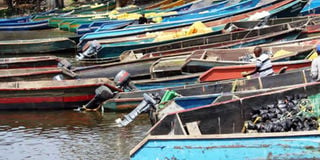Prime
Fishermen ask govt to regulate fish prices

Boats tied up at Nkose Landing Site in Kalangala District after fishermen went on strike early this week. PHOTO / GERTRUDE MUTYABA.
What you need to know:
- Fish processing and exporting companies currently buy a kilogramme of Nile Perch at various landing sites at between Shs5,000 and Shs9,000, down from Shs14,000 two months ago.
A section of fishermen on Lake Victoria have laid down their tools protesting the declining prices of fish amid rising cost of fuel.
Fish processing and exporting companies currently buy a kilogramme of Nile Perch at various landing sites at between Shs5,000 and Shs9,000, down from Shs14,000 two months ago, while Tilapia costs Shs4,000 from Shs10,000.
Mr Stephen Kavuma, a fisherman at Nakibanga Landing Site in Kyamuswa Sub-county, Kalangala, said they have suspended their activities so that they can engage the fish processors and exporters.
“We have indefinitely suspended fishing activities until government intervenes to fairly regulate fish prices. It doesn’t make business sense to buy fuel at Shs9,000 a litre and sell a kilogramme of fish at as low as Shs7,500,” Mr Kavuma said during an interview on Tuesday
In Kalangala, fishermen at the landing sites of Lwabaswa, Kisaba, Misonzi, Kitobo, Kaaya, Kachanga, Ssemawundo, Buwunge, Misenyi and Mwena – all located in Kalangala Town Council, have already tied up their boats .
“We want our district leaders to rally behind us and we push for better fish prices,” Mr Kavuma added.
Mr Rajab Ssemakula, the Kalangala District chairperson, said his leadership has no control over fish prices.
“However, we plan to engage the Fisheries ministry to address the matter. We are also concerned about the revenue we miss out as a district from the fish dealers and processors in Entebbe, who pay huge taxes to authorities in Wakiso District yet the most tonnes of fish come from Kalangala islands,” he said.
Kalangala District has 5,354 boats spread at 68 landing sites where they generate Shs600m as revenue annually.
Mr Tomson Ssebaggala, a fisherman at Mwena Landing Site in Kalangala District, said: “This sub-sector [fisheries] fetches a lot of revenue to the government, but we are not adequately supported to sustain our business, especially in hard times like now,” he said.
Mr Muhammad Ssenkoola, a prominent fish trader at Mwena Landing Site in Kalangala Town Council, said fish prices, specifically for Nile Perch, are determined by the fish processing and exporting companies, which agree to buy at a standard price.
“We are left with no option, but to sell our fish to Indian businessmen who are the sole exporters” he said.
By press time, we could not get a comment from Mr Sujal Goswami, the chairperson of Uganda Fish Processors and Exporters Association.
However, Mr Jackson Baguma, the Kalangala District production and marketing officer, advised the fishermen to use this period to fight those still engaging in illegal fishing.
“It is true the fish prices are low, but the catch is also low. I urge the fishermen who have laid down their tools to work with the army in fighting illegal fishers because they are responsible for the dwindling fish stocks,” he said.
The vice chairperson of Masese Fishers Association in Jinja City, Mr Philmon Kudeli, said some fishermen had already suspended fishing due to low fish catch exacerbated by poor fishing methods.
“We could have managed the current situation (of low fish prices) if the fish catches were stable, but we are investing a lot and earning little,” he said.
Mr Tom Bukenya, the commissioner of fisheries’ control regulations and quality assurance at the Ministry Agriculture, said the fishermen had not yet officially addressed their plight to government.
“Government acts when there is formal a communication from those affected. When they [fishermen] write to us, we will see how to intervene,” he said.
Fish in Uganda
Over the last 15 years, the fisheries sector has played an important social and economic role in Uganda as the second largest foreign exchange earner. However, fish exports and value have declined in the past couple of years, especially due to Covid-19 restrictions.
Data from the central bank indicate that during the period between June 2020 and July 2021, at least 15,149 tonnes of fish worth $118.6m (about Shs447.3b) were exported compared to 23,141 tonnes worth $146m (Shs551b) that were exported in a similar period during the previous year.
Compiled by Al-Mahdi Ssenkabirwa, Sylvester Ssemugenyi, Denis Edema, Eve Muganga & Wilson Kutamba




